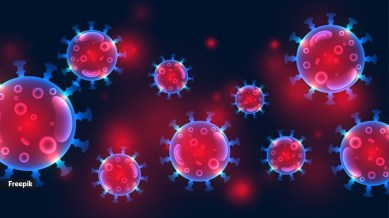📣 For more lifestyle news, click here to join our WhatsApp Channel and also follow us on Instagram
HMPV Cases: Understanding isolation guidelines, contagious period, and precautions to prevent spread
“Cases like this are typically seen around this time of year, and they're not unusual,” says Dr Vivek Nangia, vice chairman and head of the pulmonology department at Max Healthcare

Human Metapneumovirus (HMPV) is a significant cause of respiratory illnesses, particularly in young children, older adults, and immunocompromised individuals. After cases were detected in Karnataka, all states have been urged to enhance surveillance for Severe Acute Respiratory Illnesses (SARI) and Influenza-Like Illnesses (ILI) to monitor for any increase in respiratory infections amid the alleged spread of the Human Metapneumovirus (HMPV) in China.
During a meeting with officials from the Integrated Disease Surveillance Programme (IDSP), Union health ministry officials instructed increased surveillance of SARI and ILI cases, according to a health official in Karnataka. “An advisory has been issued stating that all SARI cases should be tested for HMPV, and testing kits will be dispatched to the states,” the official confirmed with indianexpress.com.
monthly limit of free stories.
with an Express account.
While the symptoms can range from mild to severe, understanding the recommended isolation period for HMPV cases is crucial to prevent its spread and ensure proper recovery.
However, what guidelines should individuals follow, and how can isolation practices protect the patient and the community?
Recommended isolation period for someone diagnosed with HMPV
Dr Ravi Shekhar Jha, director of pulmonology at Fortis Hospital Faridabad, tells indianexpress.com, “The exact isolation period for HMPV is not yet fully established, but it is recommended to remain isolated until symptoms subside.”
Dr Vivek Nangia, vice chairman and head of the pulmonology department at Max Healthcare, adds, “The main factor is infectivity. The virus has an incubation period of two to three days during which a patient may not show symptoms but can still be contagious, and the transmission risk remains high for about five to seven days.”
Even if there are no symptoms, Dr Jha notes, HMPV is an RNA (Ribonucleic acid) virus, and its RNA can be shed in respiratory secretions for five to 14 days after the onset of symptoms. “Therefore, the ideal isolation period is 14 days,” he notes.
Dr Nangia further said that the isolation period is generally “the same for both adults and children.”
At what stage of the illness is HMPV most contagious?
HMPV infection is most contagious during the early days when symptoms are most pronounced, notes Dr Jha. “During this time, the viral concentration is at its peak in respiratory secretions, as the virus is actively multiplying. The period from 3 to 6 days after symptom onset is the most contagious phase.”
“It’s most contagious around the third or fourth day of the illness, although transmission can happen during the early stages as well,” notes Dr Nangia.
How can individuals minimise the risk of spreading HMPV to others?
According to Dr Nangia, standard precautions are key: maintain a safe distance, wear an N95 mask, practice hand hygiene, and follow proper cough etiquette. “If symptoms like cough or fever develop, individuals should stay home for at least three to four days until symptoms subside.”
The key precautions, Dr Nangia asserts, include practicing good hand hygiene, maintaining a safe distance, and wearing a mask when handling infected individuals. Since the virus spreads through respiratory droplets when someone coughs or sneezes, avoiding close contact is important. “Also, it spreads via fomites, meaning that objects touched by an infected person can harbour the virus. Therefore, it’s crucial to sanitise surfaces regularly. And, of course, we should return to more traditional greetings, like Namaste, instead of shaking hands, to avoid contact transmission.”
What symptoms or changes in condition indicate that it’s safe for someone to end their isolation after HMPV infection?
Dr Jha states, “The resolution of fever, cough, and coryza without the ]medication can indirectly indicate that the isolation period has ended.”
Concurring, Dr Nangia says, “Once the cough and cold symptoms have settled, it’s generally safe to end isolation,” adding that HMPV is not a major cause for concern. “Cases like this are typically seen around this time of year, and they’re not unusual. However, it’s important for us to stay vigilant, follow precautions, and avoid complacency.”
DISCLAIMER: This article is based on information from the public domain and/or the experts we spoke to. Always consult your health practitioner before starting any routine.
📣 For more lifestyle news, click here to join our WhatsApp Channel and also follow us on Instagram